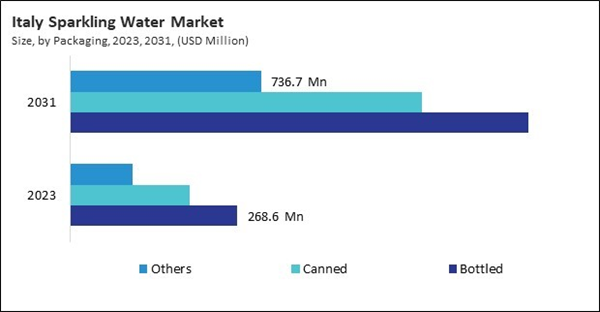Caffeinated water combines the refreshing effervescence of water with the energizing effects of caffeine, offering consumers a unique and invigorating beverage option. This type of water typically contains natural caffeine extracted from sources like coffee beans or tea leaves, providing a mild boost in energy without the calories or sugars found in traditional caffeinated drinks. Caffeinated water is often favored by individuals looking for a healthier alternative to sugary sodas or energy drinks, as it offers hydration alongside the stimulating effects of caffeine. Thus, the Germany market consumed 213.69 kilo tonnes of caffeinated sparkling water in 2023.
The Germany market dominated the Europe Sparkling Water Market by Country in 2023, and would continue to be a dominant market till 2031; thereby, achieving a market value of $6,437.6 Million by 2031. The UK market is exhibiting a CAGR of 10.9% during (2024 - 2031). Additionally, The France market would experience a CAGR of 12.8% during (2024 - 2031).
Many water brands offer more sustainable packaging options, such as aluminum cans and glass bottles. Consumers concerned about environmental impact may choose water brands that prioritize sustainability and eco-friendly packaging. This water is available in various formats, including bottled, canned, and even on tap in some places. Its convenience makes it an attractive option for people looking for a refreshing drink at work, school, or traveling. Growing concerns about the negative health effects of excessive sugar consumption have led many consumers to seek sugar-free alternatives.
This water offers the carbonation and flavor of traditional sodas without the added sugars, making it an attractive option for health-conscious individuals. Consumers increasingly prioritize health and wellness, driving the demand for healthier beverage options. This water is perceived as a healthier alternative to sugary sodas and soft drinks, as it contains no added sugars, calories, or artificial sweeteners.
E-commerce platforms provide access to a broader selection of water brands and flavors than traditional brick-and-mortar stores in Spain. E-commerce allows water brands to sell directly to consumers, bypassing traditional distribution channels in Spain. E-commerce platforms offer subscription services and auto-replenishment options for water products in Spain. According to the International Trade Administration, the number of e-commerce consumers in Spain reached 30 million in 2021. eCommerce penetration was estimated at 63%, and internet penetration at 83% in 2021. By 2025, there will be 37 million eCommerce users, a 25% increase. Thus, all these factors will uplift the regional market’s expansion in the coming years.
Based on Type, the market is segmented into Natural/Mineral, and Caffeinated. Based on Packaging, the market is segmented into Bottled, Canned, and Others. Based on Distribution Channel, the market is segmented into Supermarkets & Hypermarkets, Convenience Stores, Online, and Others. Based on countries, the market is segmented into Germany, UK, France, Russia, Spain, Italy, and Rest of Europe.
List of Key Companies Profiled
- Nestle S.A.
- PepsiCo, Inc.
- Keurig Dr Pepper, Inc.
- The Coca Cola Company
- Montane Sparkling Spring Water
- WakeWater Beverage Co.
- National Beverage Corporation
- Big Watt Beverage Co.
- Danone S.A.
- Volay Brands, LLC
Market Report Segmentation
By Type (Volume, Kilo Tonnes, USD Billion, 2020-31)- Natural/Mineral
- Caffeinated
- Bottled
- Canned
- Others
- Supermarkets & Hypermarkets
- Convenience Stores
- Online
- Others
- Germany
- UK
- France
- Russia
- Spain
- Italy
- Rest of Europe
Table of Contents
Companies Mentioned
- Nestle S.A.
- PepsiCo, Inc.
- Keurig Dr Pepper, Inc.
- The Coca Cola Company
- Montane Sparkling Spring Water
- WakeWater Beverage Co.
- National Beverage Corporation
- Big Watt Beverage Co.
- Danone S.A.
- Volay Brands, LLC









